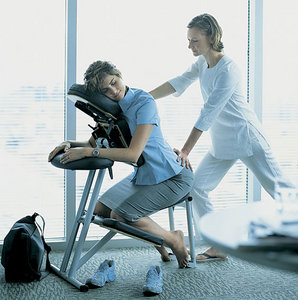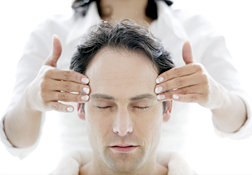 |
 |
|
|
Health Articles:
Alternative and General Health
Musculoskeletal Health
Nutrition and Herbs
Pediatric Health
Senior Health
Sports & Fitness
Women's Health
Ask A Doctor (Forum)
|
By Nora Brunner Stress: the word has been bandied about so much it's nearly lost all meaning, being used as a catch phrase for every discomfort associated with busy lifestyles and trying times. But there is truly a biological component to stress, involving the release of certain neurochemicals and hormones into the body. These substances flood the nervous system with messages that essentially scream, "The sky is falling!" This repeated flooding of the emergency chemicals can have a meaningful impact on health. While these stress chemicals served their purpose in caveman days, providing armament against attacks by wild beasts, the stress response may seem a bit over the top when all we are facing is gulping coffee on our way to work or listening to the news while stuck in traffic. Yet these chemicals may flow despite there being no real threat, and that's not something to trifle with.
We might ride the chemical roller coaster during the day as we try to pour 2 gallon's worth of activity into a 1-gallon container. We enter the massage room coiled like springs, wound tightly from driving, sitting in chairs, pushing shopping carts, and craning necks to hold a phone in place. All of this activity and a buildup of stress responses express themselves through the body. If one part of the posture is out of whack - say the shoulders are hunched forward - it throws off alignment throughout the rest of the structure. This adds up to tight muscles, compressed organs, pain and fatigue. Massage is one way to reclaim human contact while re-establishing balance and alignment.
For those who feel a bit undeserving of the pampering, full-body massage, there's enough science on the health benefits to ease even the strictest conscience. Massage has been shown in scientific studies to help with serious medical conditions, including reducing pain and anxiety in burn and cancer patients, and relieving pain from arthritis, fibromyalgia, osteoarthritis and surgery. It also can benefit people with eating disorders and Alzheimer's disease. If your own medical condition isn't this serious, you'll be happy to know massage strengthens the immune system, makes workers more productive, improves sleep, and reduces angst and withdrawal symptoms in people trying to kick cigarette and alcohol addictions. There's other evidence massage relieves tension headaches, migraines, and lower back pain. Self-reported results indicate massage rules when it comes to soothing stress, decreasing anxiety, and improving self-esteem. If massage can provide such relief in the case of serious illness, how many more benefits can you reap when you're healthy, albeit somewhat frazzled? |

